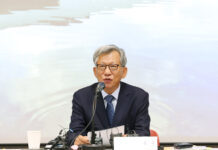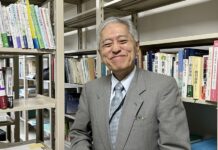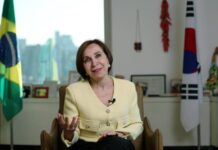| This year, Korea marks the 60th anniversary of diplomatic relations with 15 Latin American countries — Mexico, Argentina, Colombia, Chile, Ecuador, Guatemala, the Dominican Republic, Panama, Costa Rica, Paraguay, El Salvador, Honduras, Jamaica, Nicaragua and Haiti. In 1962, Korea began its path toward modernization through ties with just 27 countries, but in the same year, it forged formal relations with 15 of the 20 Latin American nations achieving independence at the time. Korea.net explores the direction of cooperation between Korea and its Latin American partners through interviews with ambassadors from the region. |
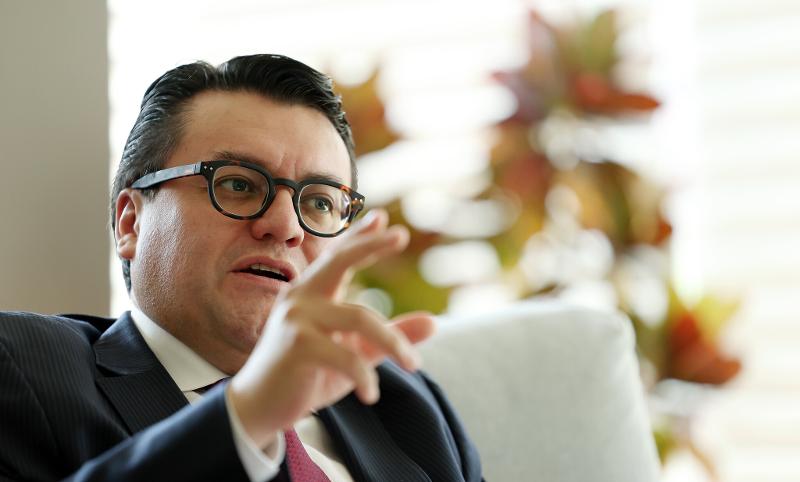
Ambassador Juan Carlos Caiza Rosero on May 12 said Korea and Colombia will upgrade their “strategic cooperative partnership” to an “inclusive and sustainable relationship for digital innovation.”
By Yoon Sojung with contribution from Jeong Mi Kyung
Photos = Jeon Han
Video = Jeon Han, Kim Sunjoo and Lee Jun Young
Seoul | May 12, 2022
“Korea is the only Asian country having a free trade agreement with Colombia and the latter’s gateway to Asia.”
In a May 12 exclusive interview with Korea.net at his official residence in Seoul’s Seongbuk-gu District, Colombian Ambassador to Korea Juan Carlos Caiza Rosero explained Korea’s importance to Colombia on the occasion of the 60th anniversary of bilateral ties this year.
He said the state visit to Korea in August last year of Colombian President Ivan Duque is the most important event in bilateral relations so far, adding that the joint statement adopted by both leaders created a new opportunity for boosting ties.
The statement mentioned inclusive and sustainable development for digital innovation and a vision for future-looking bilateral relations.
Ambassador Caiza recommended the forthcoming Seoul International Book Fair as a “must-see event” in Korea to mark the 60th anniversary of diplomatic relations. Slated for June 1-5 at the Seoul COEX in the capital’s Gangnam-gu District, the fair will be the first occasion in Asia where people can learn about Colombian literature on a large scale, he added.
The event will be fully held offline for the first time in three years, with Colombia being the guest country of honor, and feature 21 works by leading Colombian authors such as Nobel laureate Gabriel García Marquez, whose best known novel is “One Hundred Years of Solitude.” Korea was the guest country of honor at the Bogota International Book Fair, which ran from April 19 to May 2 in the Colombian capital.
Assuming his post in 2019, the ambassador served as vice minister of transportation in 2012, chief of staff to the director general of the Colombian National Planning Department from 2014-18, and consultant for the Global Green Growth Institute from 2018-19.
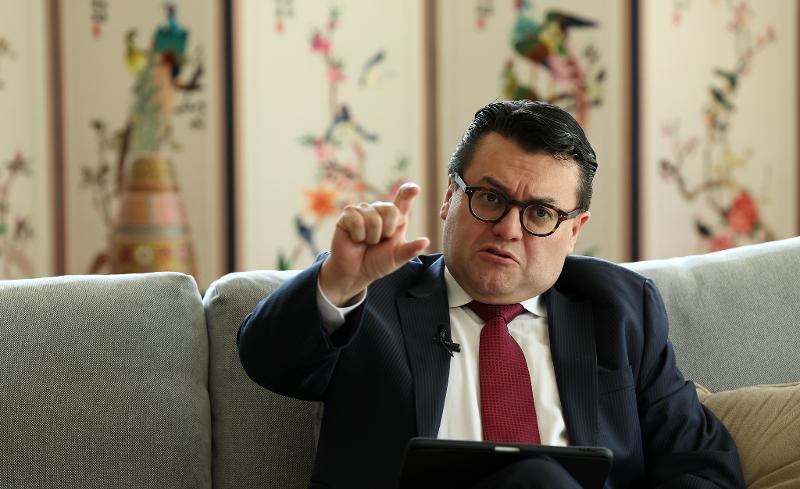
Ambassador Juan Carlos Caiza Rosero on May 12 said Korea and Colombia will upgrade their “strategic cooperative partnership” to an “inclusive and sustainable relationship for digital innovation.”
– Korea and Colombia this year mark the 60th anniversary of bilateral relations. What do you feel has been the most important task for boosting ties over the last 60 years?
Both countries have developed their bilateral relationship on a very strong foundation of common values such as solidarity, democracy and freedom for 60 years. As the only Latin American country that officially sent troops to the Korean War, Colombia responded effectively to the call of the United Nations in 1951 along with other countries to form coalition forces to protect the Korean Peninsula.
Since establishing diplomatic ties in 1962, the two countries have continued to develop relations in many sectors including people-to-people exchange, education and technology. Leaders of both countries have also displayed active summit diplomacy. The bilateral relationship was upgraded in August last year when Colombian President Ivan Duque paid a state visit to Korea. At that time, both countries signed 12 agreements in areas such as public health, science, technology, ICT, culture and creative industries, innovation, digital government and smart farms. These agreements led to unprecedented momentum in bilateral relations going toward sustainable digital cooperation.
– What event of the Colombian Embassy is a must-see for people here to mark this diplomatic milestone?
I would say the international book fairs hosted by each country this year. Korea was the guest country of honor at the Bogota International Book Fair that opened on April 19. This time, Colombia is the guest country of honor at the Seoul International Book Fair. This will be the first time for Asia to access the richness of Colombia’s literature and cultural diversity. Under the motto “Colombia: Creative, Diverse and Fraternal,” the Seoul fair will invite 17 Colombian writers and feature book exhibitions, talks with authors and concerts.
Other places will also provide the feel of Colombian culture. A series of cultural events will open such as a Colombian movie screening on June 4 at Megabox COEX at 6:30 p.m. At Ttukseom Hangang Park on June 5 at 7 p.m., a salsa performance and live concert will be held.
– How has bilateral cooperation in health and medicine progressed amid the COVID-19 pandemic?
First, I congratulate Korean health authorities for successfully responding to the COVID-19 pandemic. On the occasion of President Duque’s visit to Korea last year, both governments agreed to share their experience and knowledge in cooperation in public health for preventing and responding to disease.
In addition to donating gloves and masks, Korea agreed to share with Colombia training, successful practices and resources and jointly implement a response center for diagnosis and prevention of COVID-19.
Korea donated USD 9.5 million to Colombia through the two-phased Korea-Colombia Response Center for the COVID-19 Emergency Project, and a related memorandum of understanding was signed by both sides. The first phase supported the planned expansion for ICUs in Bogota, strengthening of the technical capacity of personnel in health and boosting of professional competency for taking samples from Engativa Hospital. The second involves equipping hospitals with a post-COVID recovery unit and bolstering the campaign deployment of a national plan for vaccination against COVID-19 in Bogota.
– What progress has been seen in bilateral trade after the free trade agreement between the two countries took effect in 2016?
Since signing the free trade agreement in 2016, bilateral trade relations have seen steady growth. Korea is the only Asian country that Colombia has a free trade agreement with. As the Colombian ambassador, I hope that Korea can actively utilize Colombia as a strategic regional hub in Latin America. Also, the Korean market is now the gateway to Asia for Colombian entrepreneurs, who see an increasingly important opportunity in this part of the world.
In 2015, the year before the free trade deal took effect, Colombia suffered a trade deficit of USD 856 million with Korea, but the imbalance has since narrowed. Colombian exports to Korea jumped from USD 402.1 million in 2016 to USD 586 in 2021. Our key export items include coal, coffee, flowers such as roses and carnations, avocados and bananas.
– What sector does Colombia wish to expand cooperation in with Korea and why?
I would say infrastructure, agriculture, science and creative industries. I also hope that Korean companies take part in subway construction in Bogota and energy projects in Colombia.
In the cultural sector, both countries decided to collaborate in the development of creative industry, films, and music backed by digital technology and content development. In Colombia, Korean companies like CJ Entertainment are filming the movie “Bogota,” a joint Korean-Colombian production about Korean immigrants in Colombia. Colombia is also a leader in the creative industry. We know that Korea also has a well-developed creative industry and wish to work together, learn from each other and jointly advance in the digital sector. And we wish to expand cooperation in responding to the Fourth Industrial Revolution through ventures such as 4.0 projects.
– What Colombian food or culture do you wish to introduce to Koreans?
Colombia has diversity, creativity and cultural uniqueness. We are the only country in Latin America with the geographical characteristics of seven regions including the Caribbean, Amazon and Pacific.
At the Seoul International Book Fair, one can feel the charm of Colombia. Through the books of Gabriel Marquez, readers can learn about the Caribbean and Amazon regions. People can feel the cultural uniqueness, diversity, openness, beautiful nature, charms of the ecosystem and the fraternal bond we share with Korea.
arete@korea.kr


